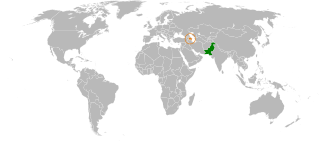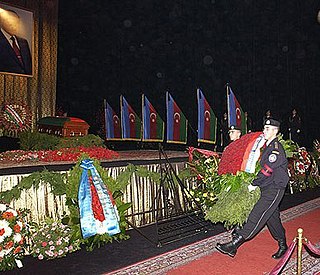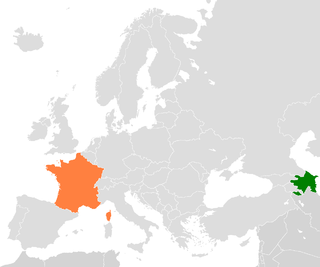
Relations between Turkic Council and Azerbaijan started from the year of 2009 until present. Taking into account of the establishment date (October 3, 2009) of the organization, Azerbaijan continues relations as a member of the founding country. [1]

Relations between Turkic Council and Azerbaijan started from the year of 2009 until present. Taking into account of the establishment date (October 3, 2009) of the organization, Azerbaijan continues relations as a member of the founding country. [1]
Economic relations among the member states considered as the main field that Turkic Council emphasizes cooperation and arranges several meetings and activities in order to achieve improvements. According to the First meeting of the Ministers of Economy held in Astana in 2011, the Working Groups on Entrepreneurship was launched in order to improve investment conditions and foster diversification of the economy in member states. A number of Business Forums were organized on the base of this meeting where several businesspersons from the member countries attended in. [2] In October 2014, the Third Business Forum held in Nakhchivan, Azerbaijan after the Fourth meeting of the Ministers of Economy of the Turkic Speaking States in Issyk-Kul on 19–20 June 2014.
Within the framework of the Second meeting of the ICT ministers of the Turkic Council held in Istanbul on November 9, 2017, the minister of Transport, Communications and High Technologies of Azerbaijan Ramin Guluzade put forward an initiative to implement measures for mutual recognition of electronic signature for the increase of turnover in e-commerce. The meeting followed by the statements of Secretary-General of Turkic Council Ramil Hasanov, Ahmet Arslan Minister of Transport, Maritime Affairs and Communications of the Republic of Turkey, Abdysamat Sagymbayev Deputy Minister of the Committee of Information Technology and Communications of the Kyrgyzstan, Vitaliy Yaroshenko Deputy Chairman of the Communication, Information and Mass Media under Ministry of ICT of Kazakhstan. [3] [4]
On August 16, 2013, the Third Summit of the Turkic Council was held in Gabala, Azerbaijan by the participation of the presidents of the founding countries such as the president of Azerbaijan Ilham Aliyev, president of Kazakhstan Nursultan Nazarbayev, president of Kyrgyzstan Almazbek Atambayev, president of Turkey Abdullah Gul and deputy prime minister of Turkmenistan Sapardurdy Toyliyev. “Transport and Connectivity” was the primary subject of the summit. The summit finished by signing a “Declaration of the Third Summit of the Cooperation Council of Turkic Speaking States. However, during the summit “Protocol of Cooperation among the Ministries of Foreign Affairs of member states of the Turkic Council” was signed. [5]
Azerbaijan cooperates with neighboring member states in a sphere of energy security and conducts activity in the Caspian Sea with Kazakhstan and Turkmenistan and the main export routes pass through Turkey. In July 2013 the first meeting of Ministers of Transport held in Baku. Within the framework of the meeting, main issues were discussed in order to accomplish an integrated transport through the Central Transport Corridor passing through member states and seaports of Caspian and Black Sea.
According to the speech of the Azerbaijani president Ilham Aliyev at the Fifth Summit of the Council of Cooperation of Turkic Speaking States, Azerbaijan cooperates and invests in neighboring countries, Turkic Speaking states such as Kazakhstan and Turkmenistan. He stressed the role of Azerbaijan as a transit country for them. Furthermore, the commence of the building a new International Sea Trade Port in Baku with 25 million tons of cargo capacity and Baku-Tbilisi-Kars railway will connect Asia and Europe by passing through Kazakhstan and Azerbaijan. [2]
Turkic Culture and Heritage foundation launched by the initiative of Azerbaijan at the Second Summit of Turkic Council held in Bishkek in 2012. In 2015 foundation started its activity as an international organization. [6] Headquarter of the organization is located in Baku. On September 27, the Ministry of Youth and Sport of the Azerbaijan and Turkic Council organized a youth festival dedicated to the election of Ganja as the European Youth Capital – 2016. [7]
Taking into account the Nakhchivan agreement, the Council of the Ministers of Foreign Affairs assemble a day before annual summits for discussing issues and active participation in the sphere of politics and security. Since 2013, member states have established consultations on security issues. A number of meetings organized such as the First and Second meeting of Deputy Foreign Ministers of member states, respectively, in Baku and in Astana. The main issues discussed in these meetings covered both regional and international security problems such as, Armenia – Azerbaijan Nagorno Karabakh conflict, the Istanbul process of Afghanistan and fighting against international terrorism. Within the framework of the Fifth Summit Turkic Council held in Astana in September 2015, governors adopted the declaration, which reflects paragraph on Nagorno Karabakh conflict “reiterate the importance of the Armenia – Azerbaijan Nagorno Karabakh conflict on the basis of sovereignty, territorial integrity and inviolability of the internationally recognized border of Azerbaijan”. [8]
The Center for Strategic Studies held a conference titled "Impact of Geopolitical Changes on the Future of the Turkic Council" in Baku on November 10, 2017. Speakers included the head of the Foreign Policy Department of the Azerbaijani Presidential Administration Arastu Habibbayli, director of the Center for the Strategic Studies in Azerbaijan Farhad Mammedov, secretary-general of the Cooperation Council of Turkic Speaking States Ramil Hasanov, head of the department of the Center for Strategic Studies under the Turkish Foreign Ministry Fatma Cigdem Tenker Koksal, executive deputy director of the Institute of Strategic Studies under the president of Kazakhstan Kazbek Issayev, and the Kyrgyz Institute for Strategic Studies Nuradil Baidoletov. [9]
On October 15, 2019, Baku hosted the Seventh Turkic Council Summit attended by Azerbaijani President Ilham Aliyev, former President of Kazakhstan Nursultan Nazarbayev, President of Kyrgyzstan Sooronbai Jeenbekov, President of Turkey Recep Tayyip Erdoğan, President of Uzbekistan Shavkat Mirziyoyev, as well as Deputy PM of Turkmenistan Purli Agamyradov as a guest, Prime Minister of Hungary Viktor Orban as an observer and heads of Turkic cooperation institutions. The participants celebrated the 10th anniversary of the Nakhchivan Agreement on the establishment of the Turkic Council in addition to Uzbekistan’s joining the organization as a full-fledged member. The title of Honorary Chairman of the Turkic Council was given to Nursultan Nazarbayev. In the conclusion of the Summit, the Heads of States signed Baku Declaration. Besides, the presidency in the Council officially passed to Azerbaijan. [10] [11]
In 2020, during the conflict starting in September, the Secretary General of the Turkic Council Baghdad Amreyev declared his support to Azerbaijan against Armenia. [12]

Heydar Alirza oglu Aliyev was an Azerbaijani politician who served as the third President of Azerbaijan from October 1993 to October 2003. As the national president, he held constitutional powers, but his influence on Azerbaijani politics had begun years earlier. As a young man he had joined the Azerbaijan SSR People's Commissariat for State Security (NKGB) and quickly rose to the rank of Major-General.

Azerbaijan–Turkey relations have always been strong with the two often being described as "one nation with two states" by the ex-president of Azerbaijan Heydar Aliyev due to both being Turkic countries.

The Baku–Tbilisi–Kars (BTK), or Baku–Tbilisi–Akhalkalaki–Kars railway (BTAK), is an international rail link project connecting Azerbaijan, Georgia and Turkey, which became operational on 30 October 2017 following several years of delays. The project was originally due to be completed by 2010, but was delayed to 2013, 2015, 2016, and, following a fifth trilateral meeting in February 2016, foreign ministers of the three countries announced that the railway would finally be completed in 2017.

Azerbaijan–Kazakhstan relations refer to foreign relations between Azerbaijan and Kazakhstan. Azerbaijan has an embassy in Nur-Sultan and a consulate in Aktau. Kazakhstan has an embassy in Baku.

Azerbaijan–Pakistan relations are the foreign relations between Azerbaijan and Pakistan. Pakistan has an embassy in Baku and Azerbaijan has an embassy in Islamabad. Bilateral Relations of Azerbaijan and Pakistan are based on Perceptive Process and Cognitive Functions and Perceptive linkages between both countries that are enhancing and consolidating contact between Baku and Islamabad. The two nations are considered "strategic partners". and Azerbaijan Pakistan security cooperation enhancing in all field of the military to military relations and also among security agencies.

Armenia and Kazakhstan established diplomatic relations on August 27, 1992. Armenia has maintained an embassy in Nur-Sultan and Kazakhstan has an embassy in Yerevan. Both countries are full members of the Eurasian Union, the Collective Security Treaty Organisation, of the Organization for Security and Co-operation in Europe and of the Commonwealth of Independent States. There are 25,000 people of Armenian descent living in Kazakhstan. Throughout the history, Kazakhstan, alongside Uzbekistan, are few Turkic countries that accept their Armenian population.

The Turkic Council, officially the Cooperation Council of Turkic-Speaking States, is an international organization comprising some of the Turkic countries consisting of Turkey, Uzbekistan, Azerbaijan, Kazakhstan and Kyrgyzstan. It is an intergovernmental organization whose overarching aim is promoting comprehensive cooperation among Turkic-speaking states. It was founded on October 3, 2009 in Nakhchivan. The idea of setting up this cooperative council was first put forward by Kazakh President Nursultan Nazarbayev in 2006.
The following lists events that happened during 2014 in the Republic of Azerbaijan.

Heydar Aliyev, the former President of Azerbaijan, died on 12 December 2003 in the Cleveland Clinic at 10 am local time from heart failure at the age of 80. On 14 December, his coffin was taken to Baku.
The 2012 ECO summit was the twelfth Economic Cooperation Organization summit, held on 16 October 2012 in Baku, Azerbaijan.

Diplomatic relations between the Republic of Azerbaijan and the People's Republic of China were established diplomatic relations on April 2, 1992. The relations between the two countries have developed smoothly and high-level exchanges have been close. Paying attention to relations with China and supporting China's principled stand on issues such as Taiwan, Tibet, Xinjiang, and "Falungong." All political forces have actively advocated strengthening friendly cooperation with China. China was one of the first countries to recognize independence. President Aliyev came to China in August 2008 and May 2014 to attend the opening ceremony of the Beijing Olympic Games and the fourth summit of the Asia Cooperation and Confidence Measures Conference. In March 2005 and December 2015, he twice went to China for state affairs. access. In June 2018, the President of the National Assembly, Assador, visited China. In May 2016, Special Envoy of Communist Party of China (CPC) general secretary Xi Jinping, member of the Political Bureau of the CPC Central Committee and Secretary of the CPC Central Political and Legal Affairs Commission Meng Jianzhu visited Afghanistan. In June of the same year, Zhang Gaoli, member of the Standing Committee of the Political Bureau of the CPC Central Committee and Vice Premier of the State Council, visited Azerbaijan.
In 1991, Azerbaijan joined the Organisation of Islamic Cooperation and started to build relations with the organization. As a result, the ambassador of Azerbaijan to Saudi Arabia was given a mandate of permanent representative of Azerbaijan to the General Secretariat of the OIC in May 1994.
The Organization for Economic Co-operation is an intergovernmental organization established in 1985 with cooperation of Turkey, Iran and Pakistan. The crucial goal of this organization is to achieve sustainable economic development, promote trade, integrate to the world economy and develop efficient transport system. Azerbaijan joined the organization in 1992. From August 2012 till 2016, the Secretary General of ECO is a representative from Azerbaijan.
The relationship between Azerbaijan and Organization of the Black Sea Economic Cooperation dates back to 1992 when Azerbaijan signed Istanbul Summit Declaration and the Bosphorus Statement.
The following lists events that happened during 2011 in the Republic of Azerbaijan.

Diplomatic relations between Azerbaijan and Kyrgyzstan were established on January 19, 1993.

In the Soviet period, the Caspian Sea was practically an inland water basin within the Soviet Union's borders and washed off the coast of Iran only to the south. Until 1992, the status of the Caspian was regulated by the Soviet-Iranian treaties. After the collapse of the USSR, emerging independent states, such as Azerbaijan, Kazakhstan, and Turkmenistan, raised the issue of dividing the Caspian Sea.

Azerbaijan–Venezuela relations are bilateral relations between the Republic of Azerbaijan and the Bolivarian Republic of Venezuela in political, socio-economic, cultural and other spheres.

Azerbaijan—France relations refer to the bilateral relations between the Republic of Azerbaijan and the French Republic in the political, socio-economic, cultural, and other spheres.

"Zangezur corridor" is a name used for a proposed transport corridor that would connect the Nakhchivan Autonomous Republic to the rest of Azerbaijan via the Syunik region of Armenia. The term has been increasingly used by Azerbaijani authorities since the end of 2020 Nagorno-Karabakh war, while Armenia has steadily objected to it, asserting that 'corridor logic' deviates from the ceasefire statement trilaterally signed at the end of that war. The terminology, the potential routes and the modes of transport connections as well as the risks they could create have been points of contention between Azerbaijan and Armenia since that agreement was signed. Rail freight transport is the only mode of transport communication that is currently deemed practical by officials from Armenia, Azerbaijan and Russia.